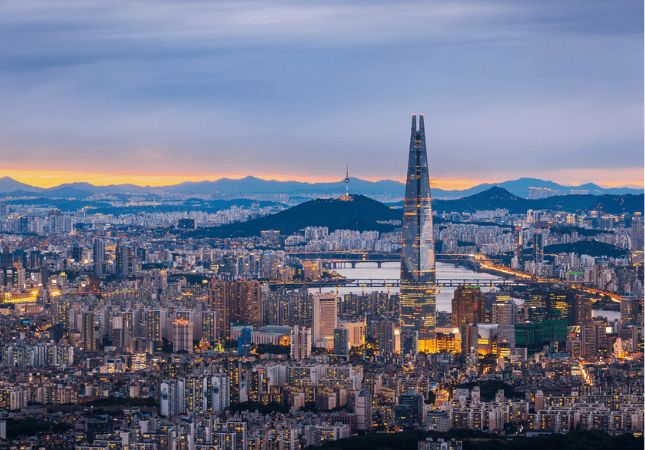The capital of South Korea, Seoul, is the second largest metropolitan area in the world, and home to over half of South Korea’s population. Seoul is ranked as the world’s most wired city (and home to the world’s fastest internet connections), first in technology readiness, and is home to Samsung, LG, and Hyundai-Kia, as well as a dozen other Fortune Global 500 companies. In addition, Seoul serves as one of the five leading hosts of global conferences. Naturally, international depositions are not uncommon in this powerhouse city.
Scheduling depositions in Seoul is no more complicated than scheduling depositions in a U.S. city. While South Korea is a party to the Hague Evidence Convention, prior permission is not required to take voluntary depositions of U.S. citizens. Depositions of Korean nationals and third-country nationals may be taken pursuant to a request to the Korean Central Authority for the Hague Evidence Convention. There are no restrictions on where such depositions may be taken. As a thriving business center, Seoul offers scores of hotels and office buildings capable of hosting depositions comfortably and efficiently. If necessary, videoconferencing (or mobile videoconferencing) is a breeze, with Seoul’s speedy internet connections mentioned previously. Most top-rate interpreters in the country live in Seoul, and the majority of them are very experienced in legal depositions.
Choose from a multitude of luxury hotels for your accommodations and enjoy Seoul’s many restaurants, with cuisine ranging from Asian to European to American and more. Seoul houses many museums, galleries, and landmarks, memorializing South Korea’s history, arts, and accomplishments. The War Memorial of Korea provides a moving experience, with much focus on the Korean War. The Seoul Olympic Museum showcases the 1988 Olympics hosted in Seoul, and the Seoul Museum of History can keep you busy for hours, representing 600 years of the city’s history. Seoul also offers free city walking tours, led by volunteers, available in Korean, English, Japanese, and Chinese.
There are no visa requirements for visits of up to 90 days to South Korea. A valid passport is required, with at least one blank page for entry stamp. It is highly recommended that your passport show six months’ validity from your planned return date any time you are traveling internationally. The U.S. Embassy in Seoul maintains a list of resources available to U.S. citizens in Seoul.
For additional information on traveling for international depositions, or assistance scheduling depositions abroad, please contact Planet Depos at 888.433.3767 or via email at international@planetdepos.com.
